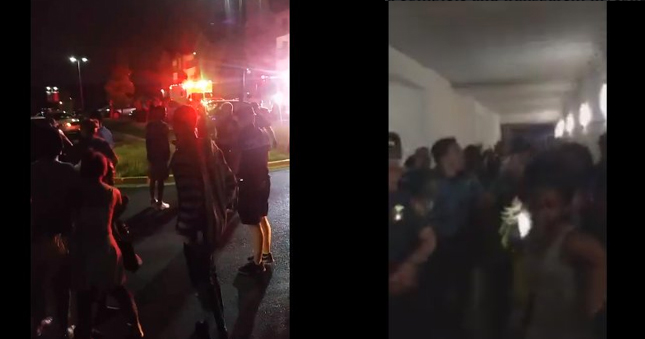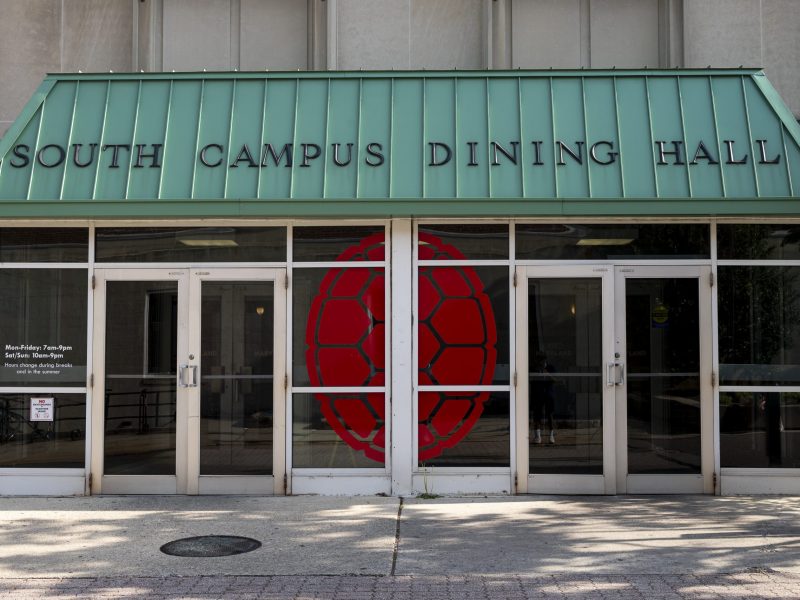The University of Maryland Police Department released body camera footage Monday depicting officers using pepper spray to break up a graduation party of predominantly black students, after a five-week investigation concluded the use of pepper spray fell within department guidelines.
Officers responded to what turned out to be a false report of a fight within a party at the Courtyards apartments on May 21, according to a summary report by University Police Chief David Mitchell. The officers decided to shut down the party, opting to deploy pepper spray twice to disperse partygoers.
The video is dark and often difficult to make out, and faces are also blurred to protect identities. The footage shows two officers responding to Courtyards, where they meet individuals in the parking lot who had made the false call. The group tells the officers that there is a fight inside the party of what they claim to be 80 people. One person mentions someone may have a bat, but others say there are no weapons involved.
Officers then knock on the door of the apartment and state they were told of a fight. Two women at the door tell the officers that no one is fighting, and there is no bat in the apartment.
The officers ask the individuals to step back from the door because they “need to see that everything is okay.” Soon afterward, an officer orders everyone out of the apartment.
As partygoers exit the apartment, a crowd begins to form in the breezeway of the building. The officers request additional units respond to the scene, citing a “very large party, refusing to break up, refusing to cooperate.” When the crowd surrounds an officer, two of them deploy pepper spray on the partygoers. Video footage shows many people screaming, and an officer says “multiple people were sprayed with O.C.,” commonly known as pepper spray. Officers then requested medical treatment for the partygoers they sprayed.
Later in the video, an officer uses pepper spray again near individuals who were receiving treatment.
Student Government Association President Katherine Swanson said watching the body camera footage affirmed that the campus needs to work toward a better relationship between students and the police department. She added that the video was “kind of shocking.”
“You can read about something but actually watching it is a little bit different, and watching how aggressive the cops were at the door of the party really bothered me and I think really bothered a lot of my cabinet as well,” the senior government and politics major said. “It was just hard to watch.”
The SGA is working with the university’s chapter of the NAACP and Phi Beta Sigma to plan a town hall to address these issues with Mitchell and university President Wallace Loh during the first week of school, Swanson said. The SGA will also be writing a letter to University Police with recommendations of how they could improve their investigations and communication with students, she added.
In the wake of the incident, many used Twitter to voice their concerns that the officers’ conduct was racially biased.
Mitchell addressed these concerns Thursday, but said the department did not discover evidence that the incident was racially motivated.
“However, my students feel that,” he added. “And perception is reality, so I agree that this is a problem for us in law enforcement with regard to trust between our community and the police.”
Junior Ja’Nya Banks, the SGA director of diversity and inclusion, said some students in the black community are frustrated that the situation escalated so quickly, especially when they see “huge, white frat parties” that never lead to such a use of force.
“It’s very common that large parties happen on campus, parties much more large scale than this … and they always seem to get shut down fine. There never seems to be any need or use for pepper spray or alarm, you don’t usually see police tackling students,” the special education major said. “So I think that’s the main concern is, why was this different? And how come things got so out of hand?”
Junior Julian Ivey has long been active on issues of police conduct and race relations. In fall of 2014, the arts and humanities major participated in a student march and a sit-in at Stamp Student Union protesting campus police militarization in response to a grand jury decision not to indict officer Darren Wilson in the shooting death of a black teenager, Michael Brown.
He was also involved in championing UMPD to begin wearing body cameras, which the department implemented in February 2015. He called the incident at Courtyards and the results of the investigation “disheartening.”
“Even here at the University of Maryland, where we strive to be progressive and we strive to be fearless, even here we have these instances,” Ivey said. “It’s just sad we’re here two years later and we’re still talking about the same things.”
The department found that the second use of pepper spray, while reasonable, “did not meet UMPD standards,” according to the report. The officer who deployed that spray has received a two-week suspension without pay, the report said.
Mitchell said Thursday that the situation never should have escalated to the point where pepper spray was used, and that he is “terribly embarrassed and humiliated” by the actions of his officers.



